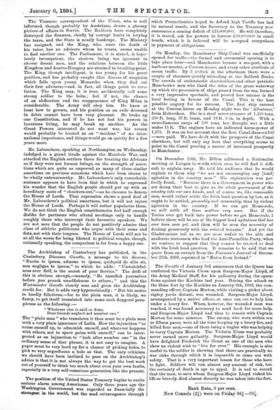The Viennese correspondent of the Times, who is well informed,
though probably by Austrians, draws a gloomy picture of affairs in Servia. The Radicals have completely destroyed the finances, chiefly by corrupt lenity in levying the taxes, and the State is nearly bankrupt. The Ministry has resigned, and the King, who, since the death of his tutor, has no advisers whom he trusts, seems unable to find another one. The Parliament, it is stated, is hope- lessly incompetent, the electors being too ignorant to choose decent men, and the relations between the little Kingdom and Austro-Hungary are strained to breaking-point. The King, though intelligent, is too young for his great position, and has probably caught that disease of suspicion which falls upon young Monarchs when they find out their first advisers,—and, in fact, all things point to revo- lution. The King may, it is true, accidentally call some strong soldier to the helm ; but if not, the chance of an abdication and the reappearance of King Milan is -considerable. The Army will obey him. He knew at least how to govern, and his position as an exile drowned 'in debts cannot have been very pleasant. He broke up -one Constitution, and if he has not lost his powers in luxurious living, he may break up another. As the Great Powers interested do not want war, his return would probably be treated as an "incident" of no inter- national importance, and things would go on quietly for a few years more.










































 Previous page
Previous page